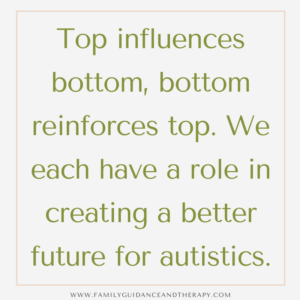This post was originally posted on Love & Autism. You can read it here.
What we say matters.
What we say shapes how we think and move through the world.
What other people say about us serves as the foundation for our self-perception and self-worth.
We know this. You know this. Yet there appears to be a disconnect between this intuitive understanding on the importance of communication in shaping our narrative and how we talk about autism.
“What autism provided was a discursive framework, a lens through which others could story my life. My hand and full-body movements became self-stimulatory behaviors; my years-long obsessions with maps and the Electric Light Orchestra became perseverations; my repetitions of lines from the movie Airplane! became echolalia. My very being became a story, a text in dire need of professional analysis. This, my body, this was autism - and suddenly, with the neuropsychologist’s signature on my diagnostic papers, I was no longer my body’s author.” Melanie Yergeau, Love & Autism 2018 speaker.
Diagnostic labels that should only be found in reports to secure funding become more than a classification, they are how many define autistics. Behaviors are not acknowledged as positive in any way, instead pathologized at every turn. Using arbitrary and limiting labels of high functioning and low functioning, with the intent to help one get a “better picture of the person with autism”, is not only insulting, but dehumanizing. Pathologizing reinforces a deficits view of autism. These labels serve no one.
No human is all one thing. We each have good days and bad. We all have struggles and strengths. Yet when communicating about autism we forget these very simple facts about what it means to be human.
I think most of us can see glaring inadequacies in the way autistic people are treated in this world. We could point fingers at the clinicians, parents, researchers, policymakers, and power holders for where we are today. The list of who to blame can go on and on if we let it, but blame won’t make the changes that we desperately need - a fundamental shift in how we communicate about autism at all levels. Remember, communication is bidirectional and recursive. Top influences bottom, bottom reinforces top. We each have a role in creating a better future for autistics. Every human being needs to be apart of the conversation.
Here are five things you can do today to change the conversation about autism (and links on where to go if you want more help):
Get curious. You don’t know other people’s stories. Recognizing what you don’t know is just as important, if not more so, than recognizing what you do know. Ask questions. (The Yes Brain by Dan Siegel)
Listen with an open heart and mind. Ask questions and be open to hearing honest answers, a challenging task when self-judgment gets in the way. Recognize that you might ask the wrong questions or run the risk of embarrassment when you make a mistake. Practice self-compassion in these moments and recognize that your intentions are not to be mean, marginalizing, or hurtful, and remind yourself of your heartfelt intent to grow. (How to talk so kids will listen & How to listen so kids will talk by Adele Faber and Elaine Mazlish)
Strengthen empathy. Empathy is a skill. It needs to be practiced to get stronger. We change the neural network of our brain when we connect with the shared emotional experiences with others, like kindness around struggle. Shame is a plague and the majority of us suffer from the debilitating message our shame creates. Nobody wants to voice it, but everyone struggles with it. Even if you can’t see it, know you are not alone. (The Gifts of Imperfection by Brene Brown)
Foster a positive interaction. Kindness has a profound effect on healing the overall stressors of the body. Positive interactive experiences foster feelings of safety and trust in relationship. Connection in a moment or bonding over a shared experience are powerful agents of change at every age. (Relationship Development Intervention - http://www.rdiconnect.com)
Shift your inner perspective. Step back from expectations, agendas, and illusions of mastery. We all have things we are working to change, get relief from, or areas we want to improve. However, we are not served if we place contingencies about our happiness or around goal attainment in these areas. Your struggle deserves your kindness, not judgment, criticism, or shame. (The Mindful Path to Self-Compassion by Chris Germer; Kristin Neff http://self-compassion.org/)
It is up to us to make this change happen and we need to be in it together. Every step in the right direction is valuable and worthy. Appreciate your efforts and remember, everyday is an opportunity for a step on the path to creating the future you want to see emerge.

